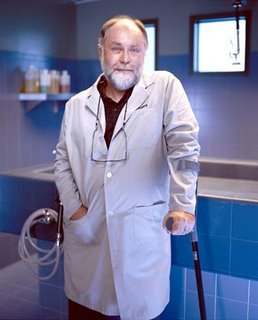
No, not that kind of TAB (illustration at left is a can of the softdrink called TaB). I'm on a search for the first use of the term "
Temporarily Able-Bodied (TAB)". Love it or hate it (and there are plenty in both camps), it's a term you'll frequently encounter in disability culture these days. I've seen vague references to its emergence from the American disability rights movement, and those seem correct, but I want specifics: who used it first? When? When was it first written down, or recorded? Here are the bread crumbs I've found so far; I'm hoping someone out there in the blogosphere can fill in the century-wide gap between the 1870s and the 1970s.
ABLE-BODIED: The
Oxford English Dictionary has cites for the use of the term "able-bodied" back to 1622 in England and North America. In the mid-1800s, it's definitely being used in official contexts, in opposition to disability, in reforms that were meant to separate deserving (disabled) paupers from the "able-bodied" pauper (who doesn't deserve public funds, by this reasoning, because he should instead work for his living).
TAPs? The earliest appearance of the phrase "temporarily able-bodied" that I've been able to find in the academic journal archive JSTOR is a 1979 article in the
Stanford Law Review. In footnote #107 in the article "Anti-Institutionalization: The Promise of the
Pennhurst Case," authors
David Ferleger and
Penelope A. Boyd explain:
"TAP is a term disabled people use to refer to so-called 'normal' people as a reminder of the vicissitudes of fate. 'TAP' is an acronym for 'Temporarily Able-bodied Person.'"
Was TAP also in use in the 1970s, or are the authors mishearing TAB? If TAP was a competing term, what tipped the balance to TAB? (Both Ferleger and Boyd are now practicing lawyers specializing in disability and mental health issues, in the Philadelphia area--perhaps my esteemed colleagues at Temple know of them?)
GEORGE WILL?!?! A 1980s appearance is mostly interesting for its source: conservative political columnist
George Will spoke approvingly about the term in a 1985 lecture at the Rehabilitation Institute of Chicago. In a 1986
Hastings Center Report article for the based on that lecture, Will says,
"We who are not physically handicapped are the 'temporarily able-bodied.' I like that because it reminds us that affliction and decline are coming to us all; they are incidental to our humanity. To be human is always to be more or less needy; it is to be increasingly needy the longer we live."
Will's version also illustrates one major problem with the term: it can be taken as an invitation to 'there but for the grace of God' thinking, an invitation that leaves unchallenged the construction of disability as a personal condition of decline, neediness, and affliction.
JUDY HEUMANN: In
a 1989 article for
International Rehabilitation Review, Ann Rae credits
Judy Heumann with introducing the term 'temporarily able-bodied' in England. So the implication is that it's an American term, commonplace enough among American activists in the 1980s to be propagated abroad.
So where does this leave me? Still in the vague "sometime in the 1970s" zone. But I suspect somebody knows the answer to this. Or an answer, anyway. Anybody?
 [visual description: photograph of Judi Chamberlin, holding a book titled "From Privileges to Rights: People Labeled with Psychiatric Disabilities Speak for Themselves" from the National Council on Disability.]
[visual description: photograph of Judi Chamberlin, holding a book titled "From Privileges to Rights: People Labeled with Psychiatric Disabilities Speak for Themselves" from the National Council on Disability.]



